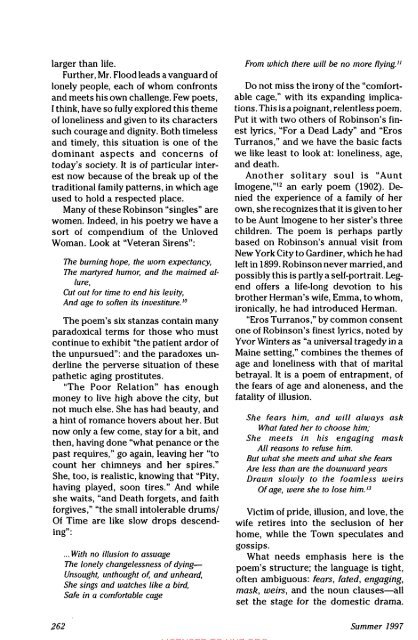Edwin Arlington Robinson: Tilbury Town Revisited
Edwin Arlington Robinson: Tilbury Town Revisited
Edwin Arlington Robinson: Tilbury Town Revisited
You also want an ePaper? Increase the reach of your titles
YUMPU automatically turns print PDFs into web optimized ePapers that Google loves.
larger than life.<br />
Further, Mr. Flood leads avanguard of<br />
lonely people, each of whom confronts<br />
and meets his own challenge. Few poets,<br />
I think, have so fully explored this theme<br />
of loneliness and given to its characters<br />
such courage and dignity. Both timeless<br />
and timely, this situation is one of the<br />
dominant aspects and concerns of<br />
today’s society. It is of particular inter-<br />
est now because of the break up of the<br />
traditional family patterns, in which age<br />
used to hold a respected place.<br />
Many of these <strong>Robinson</strong> “singles” are<br />
women. Indeed, in his poetry we have a<br />
sort of compendium of the Unloved<br />
Woman. Look at “Veteran Sirens”:<br />
The burning hope, the worn expectancy,<br />
The martyred humor, and the maimed allure,<br />
Cut out for time to end his levity,<br />
And age to soften its investiture.l0<br />
The poem’s six stanzas contain many<br />
paradoxical terms for those who must<br />
continue to exhibit “the patient ardor of<br />
the unpursued”: and the paradoxes un-<br />
derline the perverse situation of these<br />
pathetic aging prostitutes.<br />
“The Poor Relation” has enough<br />
money to live high above the city, but<br />
not much else. She has had beauty, and<br />
a hint of romance hovers about her. But<br />
now only a few come, stay for a bit, and<br />
then, having done “what penance or the<br />
past requires,” go again, leaving her “to<br />
count her chimneys and her spires.”<br />
She, too, is realistic, knowing that “Pity,<br />
having played, soon tires.” And while<br />
she waits, “and Death forgets, and faith<br />
forgives,” “the small intolerable drums/<br />
Of Time are like slow drops descend-<br />
ing”:<br />
... With no illusion to assuage<br />
The lonely changelessness of dying-<br />
Unsought, unthought of; and unheard,<br />
She sings and watches like a bird,<br />
Safe in a comfortable cage<br />
From which there will be no more flying1]<br />
Do not miss the irony of the “comfort-<br />
able cage,” with its expanding implica-<br />
tions. This is a poignant, relentless poem.<br />
Put it with two others of <strong>Robinson</strong>’s fin-<br />
est lyrics, “For a Dead Lady” and “Eros<br />
Turranos,” and we have the basic facts<br />
we like least to look at: loneliness, age,<br />
and death.<br />
Another solitary soul is “Aunt<br />
Imogene,”’2 an early poem (1902). De-<br />
nied the experience of a family of her<br />
own, she recognizes that it is given to her<br />
to be Aunt Imogene to her sister’s three<br />
children. The poem is perhaps partly<br />
based on <strong>Robinson</strong>’s annual visit from<br />
New York City to Gardiner, which he had<br />
left in 1899. <strong>Robinson</strong> never married, and<br />
possibly this is partly a self-portrait. Leg-<br />
end offers a life-long devotion to his<br />
brother Herman’s wife, Emma, to whom,<br />
ironically, he had introduced Herman.<br />
“Eros Turranos,” by common consent<br />
one of <strong>Robinson</strong>’s finest lyrics, noted by<br />
Yvor Winters as “a universal tragedy in a<br />
Maine setting,” combines the themes of<br />
age and loneliness with that of marital<br />
betrayal. It is a poem of entrapment, of<br />
the fears of age and aloneness, and the<br />
fatality of illusion.<br />
She fears him, and will always ask<br />
What fated her to choose him;<br />
She meets in his engaging mask<br />
All reasons to rehse him.<br />
But what she meets and what she fears<br />
Are less than are the downward years<br />
Drawn slowly to the foamless weirs<br />
Of age, were she to lose himN<br />
Victim of pride, illusion, and love, the<br />
wife retires into the seclusion of her<br />
home, while the <strong>Town</strong> speculates and<br />
gossips.<br />
What needs emphasis here is the<br />
poem’s structure; the language is tight,<br />
often ambiguous: fears, fated, engaging,<br />
mask, weirs, and the noun clauses-all<br />
set the stage for the domestic drama.<br />
262 Summer 1997
















